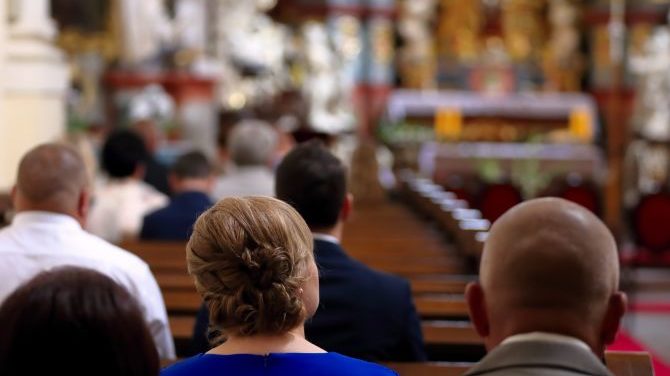The results of a new study from the Pew Research Center show that in-person Mass attendance among Catholics has yet to return to pre-pandemic levels, and only about 4 in 10 U.S. Catholics say they attend Mass in person as often as they did before the pandemic. A quarter of all Catholics say they now attend less often.
The self-reported Mass attendance numbers in the Pew study combine those Catholics who say they attend in person, virtually, or both. The drop in in-person attendance is accompanied by a 14% rise in the number of Catholics who say they attend Mass more frequently online now than they did before the pandemic. The Pew researchers suggest that participation in Mass among U.S. Catholics remained relatively stable throughout the COVID-19 pandemic, but only if virtual attendance is taken into account.
The Catholic Church teaches that Catholics are obliged to go to Mass every Sunday, “unless excused for a serious reason (for example, illness, the care of infants) or dispensed by their own pastor” (or bishop).
When virtually every U.S. diocese shuttered churches during the COVID-19 pandemic, many bishops issued dispensations from Catholics’ Sunday Mass obligation, leading to a rise in virtual worship for many. Bishops began lifting those dispensations later in 2020, with a few bishops holding out until 2022 before lifting the dispensation and inviting Catholics back to Mass in person.
The Pew researchers concluded that “the vast majority of respondents showed no change in their self-reported general level of religious service attendance over this period” — while treating in-person and virtual attendance as being equal.
“While most Americans did not report significant changes in their religious service attendance over the course of the pandemic, the share who now indicate they are attending less often than they did before the initial COVID-19 outbreak shuttered many in-person services is slightly larger than the share who say they are going more often,” Pew reported.
“Most Americans either say they attend in person at about the same rate as before the COVID-19 outbreak (31%) or that they did not attend religious services before the pandemic and still do not (42%).”
Other findings from the Pew study included:
- 84% of Catholics said in 2022 that they attend Mass at the same rate they did in 2019, whether in-person or online. Pew arrived at this figure by surveying the same individuals in 2019 and 2022. (For the adult population overall, that rate was 87%.) Six percent said they attend more often than in 2019, and 9% said they attend less often.
- 38% of Catholics said they attend in-person religious services “about as often” as before the pandemic, 24% less often, and 9% more often. This is compared with 31% of adults overall who said they attend in-person religious services “about as often” as before the pandemic, 20% less often, and 7% more.
- Protestants, especially Black Protestants, reported a larger increase in participation in virtual worship than Catholics. Twenty-six percent of Protestants overall said in 2022 that they attend virtually more often than before the pandemic, as did 35% of Black Protestants.
- Throughout most of the pandemic, about 6 in 10 Americans have not taken part in religious services in any way, including roughly 7 in 10 adults under 30 and about 9 in 10 religiously unaffiliated adults.
The present research comes following another recent survey released in January by the American Enterprise Institute, which concluded that the percentage of Americans who attend religious services is now “significantly lower” than before the COVID-19 pandemic. As of spring 2022, according to that survey, 33% of Americans said they never attend religious services, up from 25% before the World Health Organization declared a pandemic in March 2020. Religious affiliation, though, is largely unchanged, according to that survey.
The Pew study, which was done in November 2022, used a sample of 11,377 people in total, 2,207 of whom were Catholic. The margin of error was ±1.5 percentage points overall and ±3.4 percentage points for the Catholics.
The full results can be read here.

